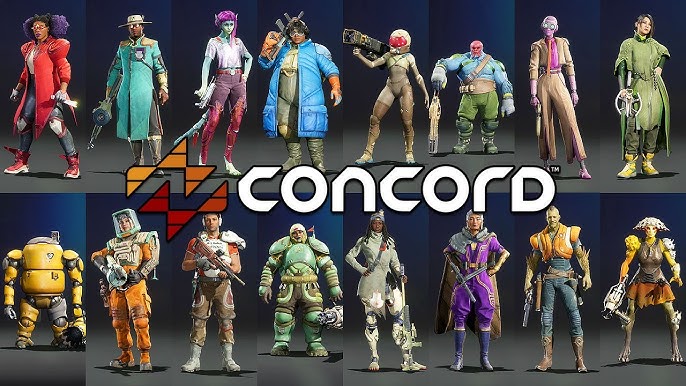In an era saturated with franchises, remakes, and reboots, it takes something truly unique to capture audiences and keep them invested for the long run. Enter Concord, a story world — whether you know it from games, books, or a cinematic universe — that has distinguished itself through its compelling cast. Concord characters have become more than just fictional personalities; they are complex figures that resonate deeply with audiences, bridging the gap between fantasy and real-life experience. But what makes these characters stand out in the crowded field of modern storytelling?
Complex Characters in a Simplistic Age
In recent years, some mainstream stories have leaned into simple, archetypal characters designed for quick recognition and easy merchandising. Concord takes a different approach. Instead of cardboard-cutout heroes and villains, Concord characters are built with nuance, flaws, and deeply human motivations.
They wrestle with moral dilemmas, conflicting loyalties, and internal contradictions that make them feel real. For example, a character who starts as a fearless leader might privately struggle with self-doubt. Another might appear villainous but acts from a place of misunderstood loyalty. These shades of gray are what make Concord’s cast so relatable — we see parts of ourselves in their struggles and victories.
Diversity Done Right
Another reason Concord characters shine is their meaningful representation. Unlike token diversity often found in modern media, Concord’s creators weave differences in culture, gender, race, and ideology naturally into the narrative. The characters don’t feel like checkboxes; they feel like people with backgrounds that affect how they see the world and how the world sees them.
This commitment to genuine representation invites a wider audience to see themselves reflected in the story. When you have a cast that feels real and inclusive, it builds loyalty and inspires fan communities to keep the world alive through art, discussion, and even fan fiction.
Evolving Through Story Arcs
Stagnant characters are the downfall of many stories. Concord sidesteps this pitfall by designing arcs that evolve alongside the narrative’s themes. Characters grow, fail, learn, and sometimes regress — just like real people. These transformations keep the audience emotionally invested because they feel earned, not forced.
Whether you follow Concord through a series of games, books, or episodes, you’ll notice that the story never resets its characters to a default mode. Consequences stick. Mistakes come back to haunt them. Friendships are tested. Betrayals sting. Growth is tangible. This gives the audience the satisfying sense that they’re witnessing genuine character development rather than plot devices moving from point A to B.
Dialogue That Feels Alive
Good dialogue is the lifeblood of a memorable character, and this is an area where Concord truly excels. The conversations between Concord characters feel organic and layered with subtext. Banter, tension, unspoken truths — all these elements turn simple exchanges into moments that reveal something deeper.
Fans often quote iconic lines not because they’re catchy one-liners but because they capture the heart of who a character is. Whether it’s a moment of vulnerability or a sharp retort during conflict, the dialogue makes these characters feel alive long after the scene ends.
Strong Relationships Drive the Plot
Stories are more than plot twists and epic battles — they are about the bonds people form. Concord characters anchor the narrative through relationships that feel authentic and evolve over time. Rivalries, alliances, friendships, and romances are treated with care, not just tacked on for drama.
These relationships often push characters to change or make impossible choices. Fans feel the stakes because when a Concord character suffers loss or betrayal, it resonates. It’s not just about what happens; it’s about who it happens to, and why we care.
Moral Ambiguity in a Polarized World
Today’s audiences are drawn to morally complex stories that don’t spoon-feed a right or wrong answer. Concord understands this instinctively. Its characters frequently face choices that blur ethical lines. Sometimes heroes must commit questionable acts for the greater good, while antagonists might act with unexpectedly noble intentions.
This moral ambiguity mirrors real life and invites the audience to grapple with uncomfortable questions. Should loyalty to friends outweigh the greater good? Is revenge ever justified? Can trust be rebuilt after betrayal? Concord characters don’t always make the right decision — and that makes them unforgettable.
Fan Engagement and Community
One measure of a story’s impact is the fan community it inspires. Concord characters have sparked countless online discussions, fan art, cosplay, and roleplay communities. Fans dissect every decision, quote, and subtle glance, hunting for deeper meaning and future hints.
This level of engagement isn’t accidental. The creators have built a layered world that rewards paying attention. Hidden backstories, symbolic motifs, and foreshadowed plot twists give fans reasons to revisit the narrative again and again.
A Template for Future Storytelling
In many ways, Concord characters have set a new benchmark for what audiences expect. They prove that when you invest in authentic characterization, it pays off in loyalty, critical acclaim, and cultural relevance. Other creators take notes — and audiences demand more from new stories. Flat characters and predictable arcs feel lazy when we’ve seen how rich storytelling can be.
Conclusion: Real People in Unreal Worlds
At the heart of it, the enduring appeal of Concord characters lies in their humanity. In a fantastical universe with impossible odds and larger-than-life stakes, they stay grounded in emotions we all understand — fear, hope, love, regret. They remind us that even in the grandest adventures, the most unforgettable stories are ultimately about people.
In a media landscape flooded with content that competes for fleeting attention, Concord shows that investing deeply in character work is never wasted. When audiences find characters they can root for, cry over, and argue about, the story becomes more than entertainment — it becomes part of their lives.
So the next time someone asks why Concord characters stand out in modern storytelling, the answer is simple: because they feel real in a world that often doesn’t.



